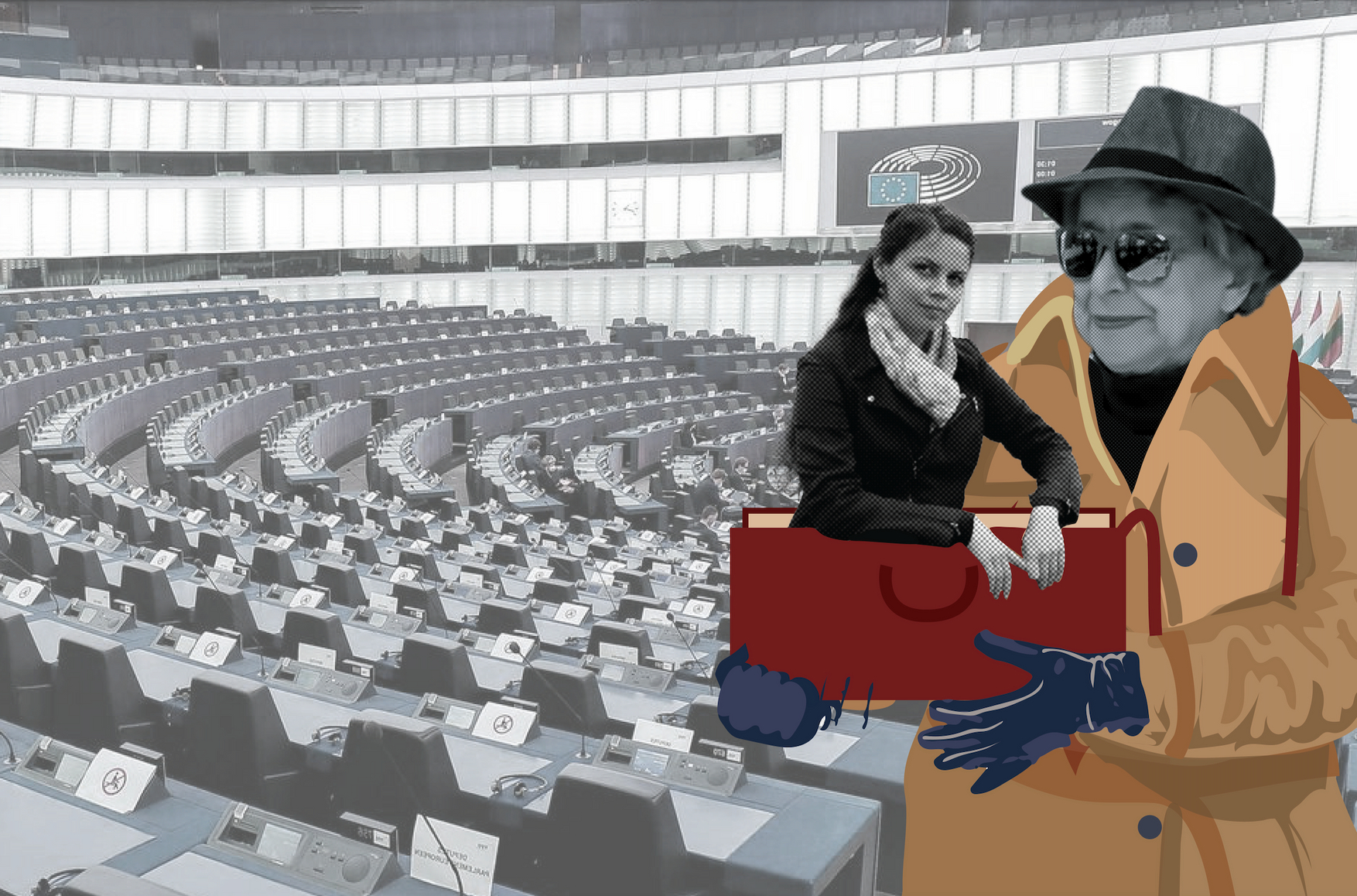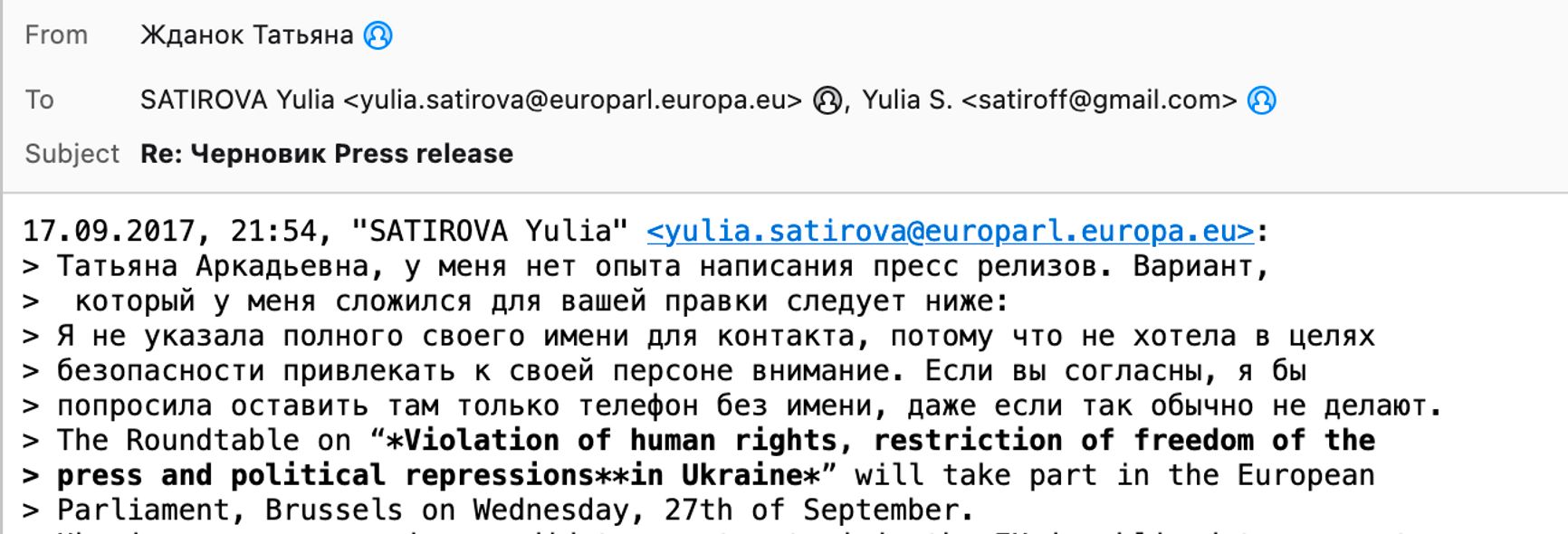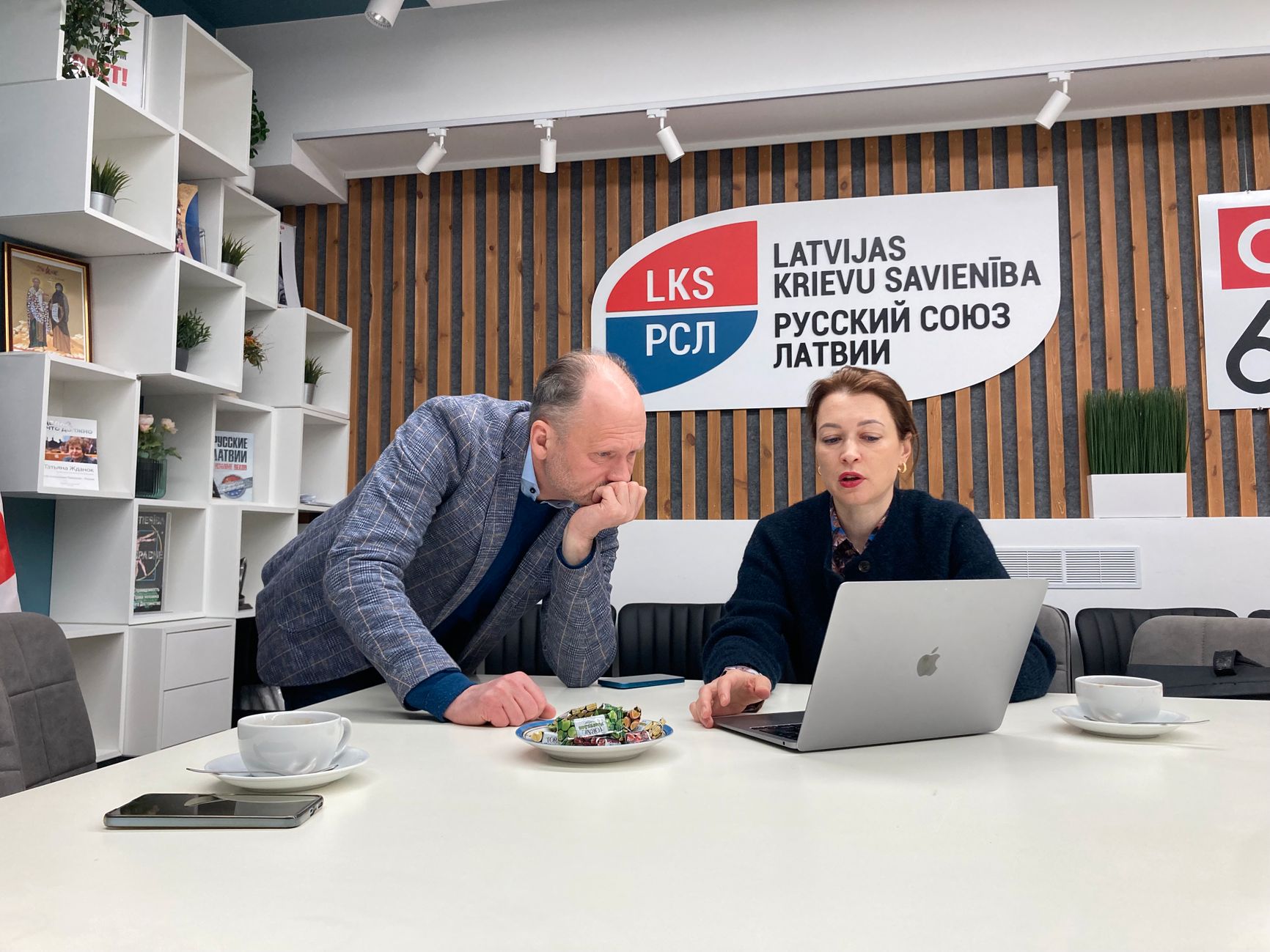

In January, The Insider and its investigative partners revealed that long-time Member of the European Parliament Tatjana Ždanoka had been reporting to her FSB handlers in Moscow over a period from at least 2004 to 2017. Mere days after that report ran, the European Parliament launched an investigation into the Latvian national’s activities. Now, The Insider and Re:Baltica have discovered evidence suggesting that Ždanoka’s assistant may also have had suspiciously close ties with Russian intelligence officers.
“Tatjana, hello. This is Dmitry. Our conversation has had results. When do you plan to be in Moscow?”
In the summer of 2014, someone known only as “Dmitry” emailed Tatjana Ždanoka, a member of the European Parliament. The trip to the Russian capital under discussion in their back-and-forth had nothing to do with tourism.
Ždanoka replied that there were no plans, but if she were invited to appear on “Solovyov's or another [person’s] program, I will definitely come,” she added, referring to Vladimir Solovyov, one Russia’s most fanatically pro-Kremlin state television presenters. “It would be even better if Miroslav [Mitrofanovs] was also invited,” Ždanoka added, referring to a Lativan MP and fellow member of the Latvian Russian Union Party. “I am sending a link to his biography on the party's website.”
Dmitry replied: “You read my mind. I wanted to ask for his details; there is an agreement. Second question. We discussed the possibility of taking on a student to you as an assistant. The candidature has been found. What documents are needed, and what steps should be taken? Thank you.”
Ždanoka answered that the “young man” – the aforementioned student assistant – should write to her official email address.
“It will be a girl,” Dmitry clarified before reporting that Mitrofanovs’ CV had been sent. He then asked whether the Latvian parliamentarian was prepared to speak only to VGTRK — the consortium of channels that airs Solovyov’s carefully orchestrated talk show — or whether the Kremlin-controlled Channel One were also suitable.
“Channel One is even better,” Ždanoka wrote back.
A few weeks later, she confirmed that she and Mitrofanovs were traveling to Russian-occupied Crimea. They were going to be passing through Moscow, and perhaps they could meet then.
Dmitry agreed, arranging to meet “at the same Kofemaniya.”
Half a year after the correspondence, Yulia Satirova officially became Ždanoka's assistant in Brussels, according to the Internet Archive’s Wayback Machine.
Ždanoka, who chose to answer The Insider and Re:Baltica's questions as part of a live show aired on the party's Tik Tok, Facebook, and YouTube channels, said that Satirova’s parents were from Odesa. Satirova, she elaborated, was in Odesa in 2014 when a clash between pro-Ukrainian activists and an encampment of pro-Russian demonstrators led to a fire at the local trade union building that killed 42 people and injured more than 200, almost exclusively from the pro-Russian faction. The young woman was evidently so affected by these events that she decided to turn to politics. Satirova was studying in Frankfurt, Germany at the time, according to Ždanoka, and her university agreed to pay for her internship with the Latvian MEP.
Information found by The Insider and Re:Baltica confirms Ždanoka’s statement. Satirova's social media accounts show photos of protests in Odessa and at the trade union building just before the fire broke out.
A relative of her’s, wearing a Soviet army boat on her head and an orange-and-black St. George’s ribbon on her chest as part of May 9 Victory Day celebrations, mentioned in an Instagram post that her parents were visiting from Odesa.
However, The Insider and Re:Baltica also discovered that Satirova avoids publicity. This is evidenced both by her sparse social network profiles and by the content of Ždanoka's emails.
After graduating from the Russian State University for the Humanities, Satirova studied in Germany or Austria — or maybe both. Her various profiles offer various hints and little clarity. Her VKontakte photo album contains pictures of her — with long, bushy hair and a childlike face that makes her look much younger — playing the violin in the orchestra of Vienna University in 2013.
But around 2015, when Satirova started working for the European Parliament, the private images largely stopped appearing. There are a few selfies, but mostly pictures of nature. There are no photos of her working at the EP, even though her duties there continued until 2019. On social media, she hides behind other names.
There are only a few links on the internet about Satirova's connection to the EP.
In 2015, the website of a Swedish NGO mentioned having contacted Ždanoka's assistant — Satirova — to find out the progress of a petition of interest to them. In 2017, she and Ždanoka were listed as participants in a conference in Bulgaria entitled “Black Sea: cooperation or confrontation?”
It is no coincidence that there is so little information about Satirova online. In 2017, Satirova emailed Ždanoka with a draft press release for another discussion, this one on the alleged “Violation of human rights…in Ukraine.”

Screenshot of email addressed to Yulia Satirova on September 17, 2017.
Source: Ždanoka's emails
“I did not put my full name into the contacts [section], because I do not want to draw attention to myself for security reasons,” Satirova wrote. “If you agree, I would ask you to leave only my phone number without my name, even if you don't usually do that.”
In 2018, Ždanoka left Brussels to run for a seat in parliament back in Latvia. She was barred from running by Latvia’s Central Election Commission owing to her membership in the country’s Communist Party after it called for a coup against the democratically elected government in 1991. During her abortive candidacy in Riga, Mitrofanovs took over Ždanoka’s mandate in the European Parliament. He also availed himself of Satirova’s professional services.
“Yes, she was my third assistant,” Mitrofanovs confirmed to Re:Baltica. He said that, in 2018, the young woman was looking for a job after completing her second university degree in Vienna. “She worked for Tatjana; I just ‘inherited’ her… I imagine she could have used some connections in Moscow or elsewhere to find herself a job in the European Parliament.”
According to a site found using the Internet Archive’s Wayback Machine in 2019 Satirova was also an assistant to another pro-Russian member of the European Parliament, Czech Communist MEP Jiří Maštálka. In 2016, Maštálka received a special award from Russian President Vladimir Putin for strengthening relations between the two countries.

Tatjana Ždanoka's deputy Miroslav Mitrofanovs tells Re:Baltica that he does not know how Júlija Satirova got to Brussels or the identity of “Dmitry,” who recommended Satirova to be Ždanoka’s assistant.
Photo: Anna Apīne
This practice of MEPs sharing assistants is possible when the representatives in question work on a common issue. When asked what the one linking the work of Mitrofanovs and Maštálka, Mitrofanovs looked confused, answering that Satirova only worked for Maštalka for three months before going on parental leave. One of her last jobs was organizing an exhibition in Strasbourg on Latvian and Czech beer traditions.
Satirova did not respond to Re:Baltica's questions on Facebook. Her profile states that she lives in Brussels.
In her long, live-streamed monologue on social media, Ždanoka did not answer the first of Re:Baltica's several questions, namely, the identity of her correspondent Dmitry — the man who asked her to hire Satirova as her assistant ten years ago.
As previously reported by Re:Baltica, Ždanoka’s first known FSB handler was Dmitry Gladey. However, several people are known to have used the email address involved in the young woman’s recruitment.
Mitrofanovs, who was supposed to go with Ždanoka to Moscow to meet the unknown figure, said he did not remember any “Dmitry.” In the end, he added, nobody had to organize his appearance on Kremlin TV channels because the shows’ producers kept inviting him themselves.
Satirova is currently “sitting at home with her children,” Mitrofanovs told Re:Baltica.
Satirova is not the only one for whom Ždanoka found a job in the European Parliament. She also managed to arrange a position for her former associate Juri Sokolovski in the Greens/European Free Alliance group. He is still there working as an advisor.
With contributions from Sanita Jemberga and the Organized Crime and Corruption Reporting Project (OCCRP).